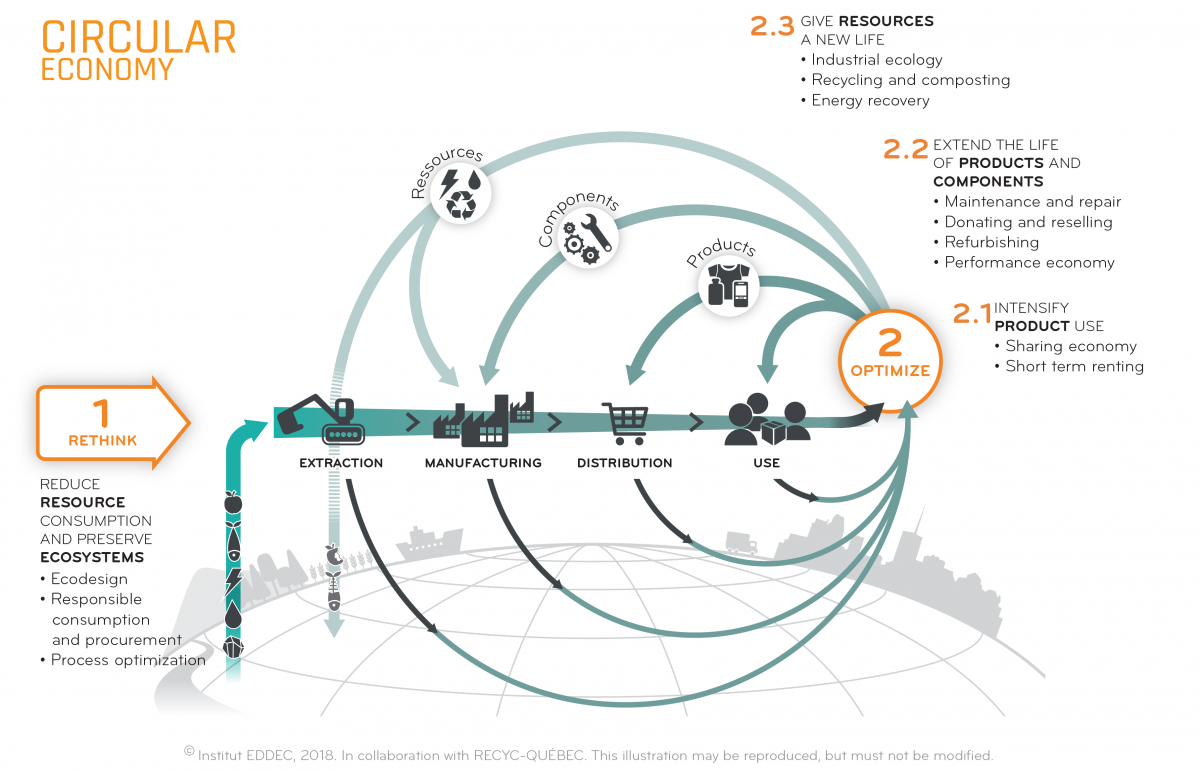More and more companies and organizations are turning towards the circular economy, an innovative concept that promotes a more efficient use of resources and reduces environmental impact. In Quebec, 39% of food residues that could be consumed, donated to food banks, or reused within the circular economy are discarded. In this article, we will explore the circular economy, its fundamental principles, and the reasons to prioritize food businesses that align with this approach.
What is the Circular Economy?
The circular economy is an economic model that aims to maximize resource utilization by encouraging reuse, recycling, repair, and regeneration of products and materials. It contrasts the traditional linear model of "take, make, dispose," favoring a more circular and sustainable approach. Key principles of the circular economy include designing products with their complete life cycle in mind, establishing industrial ecosystems where by-products become raw materials, and increasing consumer awareness of the environmental impacts of their choices.

https://www.quebeccirculaire.org/static/strategies-de-circularite.html
Coop Boomerang: A Concrete Example
Among the models driving circular economy change in Quebec is Coop Boomerang, an innovative, eco-responsible, and local company that uses spent grains to produce malted flour. Nutritionally, this flour is richer in fiber, protein, and amino acids than white flour. By transforming this by-product from beer brewing into a high-quality ingredient, Coop Boomerang contributes to reducing food waste and creating a more sustainable production loop.
10 Reasons to Choose Circular Economy Food Businesses
-
Reduced Food Waste: These businesses minimize waste by implementing strategies to prevent food losses throughout the supply chain
-
Resource Optimization: Circular economy-focused production and distribution methods reduce water, energy, and other resource consumption. For more practical tips on reducing your ecological footprint at home, check out 5 tips for eating more ecologically.
-
Sustainable Packaging: Circular food companies often adopt biodegradable or compostable packaging, thereby reducing the use of plastics and non-recyclable materials.
-
Innovation Incentive: By choosing these businesses, you encourage innovation in sustainability and motivate other companies to follow suit.
-
Support for Sustainable Agriculture: Circular businesses promote environmentally friendly agricultural practices, such as organic farming and biodiversity.
-
Transparency and Traceability: Circular businesses are often more transparent about their production practices, enabling you to make informed and responsible choices.
-
Reduced Environmental Impact: By supporting these businesses, you contribute to combating climate change and preserving our planet's health, one step at a time.
-
Boosting Local Economy: Circular businesses stimulate the local economy by favoring the use of Quebec's resources.
-
Responsibility for the Future: Supporting circular food businesses contributes to creating a more sustainable future for generations to come by preserving natural resources.
-
Driving Change: By prioritizing these businesses, you show that there is demand for sustainable products, encouraging other market players to adopt similar practices.
Contributing to a Circular and Sustainable Future
In conclusion, choosing food businesses that integrate circular economy principles represents a tangible way to support sustainability, reduce food waste, and contribute to building an environmentally respectful future. Examples like Coop Boomerang in Quebec illustrate how these principles can be put into action, thus fostering innovation and the adoption of more responsible practices within the food industry. Schedule an appointment today with a registered dietitian for informed advice on your present and future nutrition!





